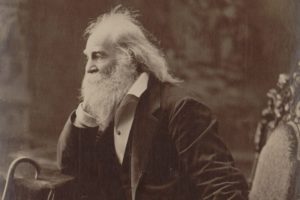
Memorial Day has its roots in the American Civil War. Both the North and South wanted to set aside days to honor their dead. After World War I, the country set aside a day to honor all Americans killed in war. Poetry was one way to memorialize dead soldiers.
One poet who dealt with the loss of Union soldiers in the Civil War was Walt Whitman. Whitman was born in 1819. He came from a poor family and had little formal education. He taught himself to write poetry. Critics and readers were often underwhelmed by his lack of rhyme, loose meter and run on sentences. Additionally, Whitman wrote about the body as well as the spirit and sometimes dealt frankly with sexuality.
History, however, was kind to Whitman. Along with Emily Dickinson, he is considered one of the great 19th century American poets. PoetryFoundation.org describes him as “the first writer of a truly American poetry.”
Whitman served as a clerk in Washington, DC, during three years of the Civil War. When he had time, he visited battlefields to help bind the wounds of the injured and buried the dead. In 1865 he published “Drum Taps,” a book of poems about the war. One of his poems, “Vigil Strange I Kept on the Field One Night,” describes the pain of a father who lost his son in combat.
The persona of the poem describes fighting side by side with his son. His son is gunned down, and in the heat of battle the person barely has a moment to say goodbye:
“One look I but gave you which your dear eyes return’d with a look I shall never forget.
One touch of your hand to mine O boy, reach’d up as you lay on the ground.”

Credit: poetryfoundation.org
Late at night after the battle was over, the father returns to the place where his son was shot and finds the body. He keeps vigil over his son throughout the night:
“Vigil wondrous and vigil sweet there in the fragrant silent night,
But not a tear fell, not even a long-drawn sigh, long long I gazed,”
The man stays with his son’s body throughout the night, reflecting that his son will never again on earth respond to a touch or a kiss. He also thinks about how he was unable to save his son because the battle was so swift and fierce.
Finally as dawn arrives, he stoically buries his son:
“My comrade I wrapt in his blanket, envelop’d well his form,
Folded the blanket well, tucking it carefully over head and carefully under feet,
And there and then and bathed by the rising sun, my son in his grave, in his rude-dug grave I deposited,”
Some elements of the poem are pure Whitman. For instance, he focuses on the son’s body far more than on his spirit or soul, though he does say he believes he will meet with his son again. He also writes the whole poem in one long sentence with a comma at the end of each line.
Memorial Day can be a difficult holiday for families who have lost a loved one in war. Poems like “Vigil Strange I Kept on the Field One Night,” can bring grieving individuals empathy and comfort.

 Memorial Day Poem: “Vigil Strange I Kept on the Field One Night”
Memorial Day Poem: “Vigil Strange I Kept on the Field One Night”


 John Mulaney’s “Funeral Planning” on Netflix: No Real Plan
John Mulaney’s “Funeral Planning” on Netflix: No Real Plan

 Composting Bodies Is Now Legal in a Dozen States
Composting Bodies Is Now Legal in a Dozen States














